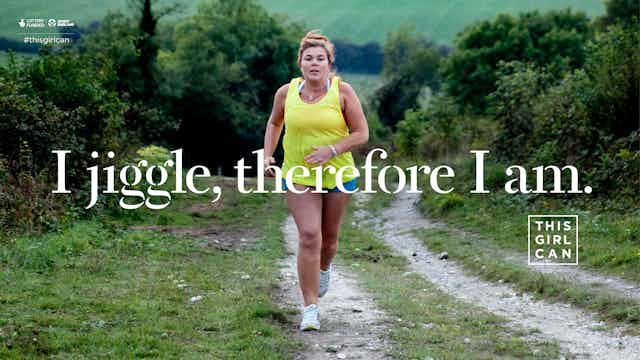Sport England has launched This Girl Can – an edgy promotional campaign that seeks to inspire women to challenge cultural assumptions about femininity that prevent them engaging in sport and exercise.
The short television clips draw upon “real” women’s bodies of difference shapes and sizes as they move, sweat, strain and take pleasure in a range of activities – swimming, kick boxing, football, dance, cycling. The dynamic footage plays to Missy Elliott’s Get Ur Freak On and offers different ways of seeing women beyond conventional representations of the static female body as an object of beauty (slim, tanned, delicate).
But there are serious problems here. For a start, why does the campaign undermine this empowering intent by referring to women of all ages as “girls”?
Throwing like a girl
Women’s sporting bodies have been subject to a long history of infantilisation and as American philosopher, Iris Marion Young said, “throwing like a girl” is a common insult that excludes women from feeling strong, capable and respected.
The marketing staff of Sport England appear not have considered how older women might respond to this less than inspiring form of address. Yes, there are older women depicted in the video, but how would they feel about being called a “girl”?

Many women will not engage with the campaign’s key message about valuing active engagement because of this kind of language. Or were they expecting women to form some kind of identification with feeling “young at heart”?
I am reminded of a marketing colleague at a previous university, who thought the image of a woman’s high-heeled shoe resting on a football was appropriate for a Masters-level sports education course.
All about ‘real women’?
By claiming to represent “real” women’s bodies what does the campaign buy into and what does it really challenge? The camera pans across a range of exercising bodies that are not normally privileged on television screens – good. But this campaign is not only still all about women’s flesh, but it tries to sell that as somehow radical or revolutionary. This is seemingly without consideration of how such symbolism might have the opposite effect to what was intended: normalising the slender body, accentuating the desirable and undesirable, what belongs and what doesn’t.

The text that goes along with these images is infused with popular post-feminist appeals to individual empowerment – “I jiggle, therefore I am”. This “can-do girl” is happy “sweating like a pig, feeling like a fox” and embracing being “hot and not bothered”. It seems these bodies, jiggly or otherwise, are just another form of objectification in a popular culture already saturated with sexualised images.
The clips repeat familiar music video formats where highly mobile, athletic female bodies are performing for a male audience. This sits uneasily with our concerns about the objectification of the female body. Research has shown that physical activity in the pursuit of desirability is something women eagerly “work on” under the auspices of the male gaze.
Having it all
So sweat is now sexy and the moving body is an opportunity for others to reflect back desirability. What is troubling about the hallmark of “have-it-all” femininity is that such identities are not equally available to all or equally desired by all women.
Advertising campaigns like this push a neo-liberal rhetoric of “free choice” to look a certain way, or move in a certain way; yet the choices available are narrow, restrictive and predicated on a narrow version of sexiness. It does not involve a stretch of the imagination to think about how women’s self-reference to “sweating like a pig” through exercise can shift into denigrating terms (“fat pig”) that are used against them if they don’t conform.
It’s disappointing that a campaign to get women more physically active doesn’t focus on how exercise strengthens friendship, reduces the stress of work and care and gives us physical and emotional strength. And we suppose it would be far too much to ask to see a campaign that shows exercise as an opportunity to find an active space outside the cult of body worship and display.

